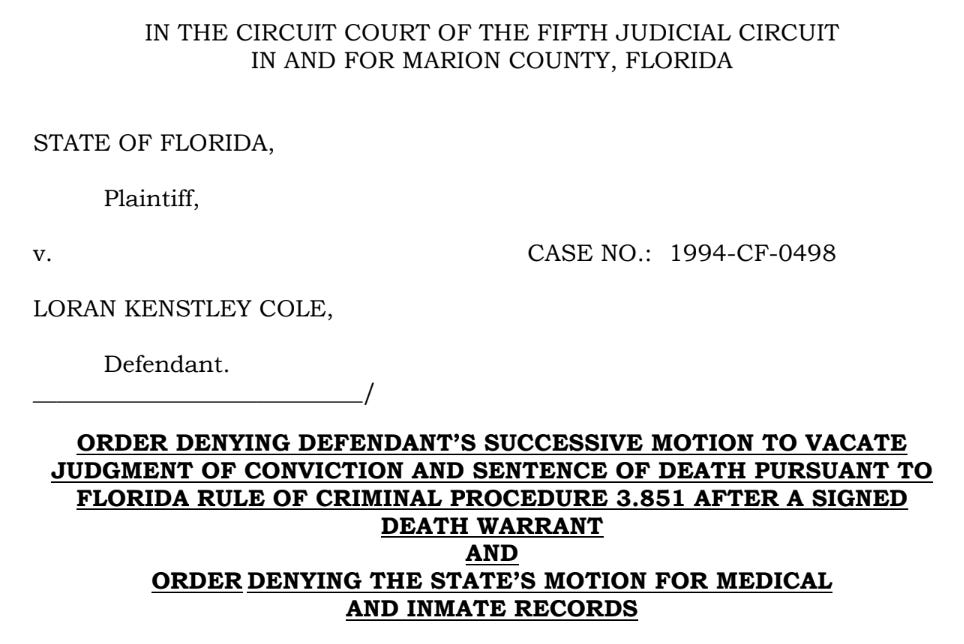Cole Warrant: Circuit court summarily denies relief
Late yesterday, the circuit court issued an Order summarily denying Cole’s successive postconviction claims filed ahead of his execution scheduled August 29.
Gov. DeSantis has issued a warrant for Loran Cole’s execution, which has been scheduled for August 29 at 6:00 p.m.
Shortly after Gov. DeSantis signed the warrant, Cole, through his attorneys, filed a successive motion for postconviction relief in the circuit court. (The Motion is covered here.) The court decided to not hold an evidentiary hearing on Cole’s claims.
Late yesterday, the circuit court issued an Order summarily denying Cole’s claims.
On Cole’s claim regarding his attendance at Dozier School for Boys (read more here), the Court determined the claim is procedurally barred. The Court held that “evidence regarding Defendant’s treatment while he attended the Dozier School is not newly discovered evidence” and his argument based on the 2024 litigation related to Dozier is an “attempt[] to relitigate the same issue he raised in two prior motions.” Further, the Court stated: “The harsh conditions at the Dozier School were exposed long ago. The State of Florida’s decision to now compensate some of those individuals who attended the school does not revive Defendant’s previously denied post-conviction claims.
On Cole’s second claim regarding his experience while in prison, the Court determined the claim is untimely because it was “raised beyond the one-year time limitation” in the Florida Rules of Criminal Procedure.
Finally, regarding Florida’s lethal injection procedures, Cole argued that his Parkinson’s disease will make the State’s use of such procedures will constitute cruel and unusual punishment. The Court denied this claim, finding that it is untimely because he “failed to raise the . . . claim” in 2017 “even though . . . he was already suffering from Parkinson’s disease.” Further, the Court held that the claim lacks merit because it is based on speculation and the DOC’s protocol is sufficient to address Cole’s claims:
The placement of an intravenous line in a patient with body movements is neither unique nor rare in the medical field. Defendant acknowledges in his Motion that restraints can secure a person’s body and block muscle movements. The Department of Corrections’ lethal injection protocols include restraints, which could be used to block muscle movements. Additionally, if an intravenous line cannot be placed, the protocols allow for the placement of a central line, with or without a venous cut-down. This protocol has previously been found to be constitutional in Asay v. State, 224 So. 3d 695 (Fla. 2017). Thus, even if Defendant could establish that he has tremors or body movement, he cannot “establish that the method of execution presents a substantial and imminent risk that is sure or very likely to cause serious illness and needless suffering.”
The full Order can be downloaded here.
Cole’s attorneys have until Monday at 9:00 a.m. to file a Notice of Appeal and any habeas petition in the Florida Supreme Court.
TFDP Prior Coverage of the Cole Warrant
My thoughts are with everyone involved in the warrant and execution process.



